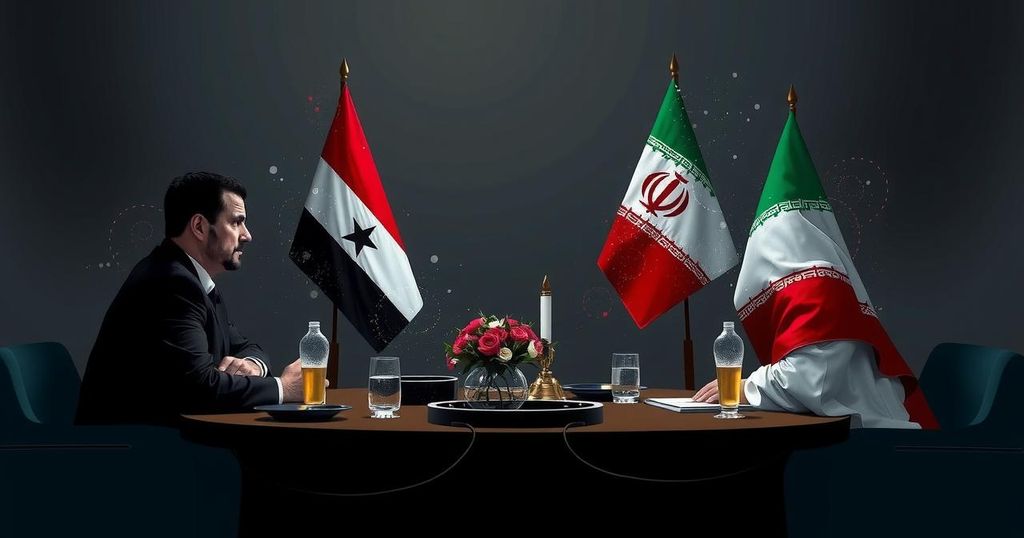The Syrian regime is intensifying diplomatic efforts for regional support due to mounting pressure from opposition forces following their loss of Aleppo. Key communications with Iraq, Iran, and the UAE reveal Assad’s attempts to stabilize the regime amid threats to territorial integrity. The evolving geopolitical landscape showcases a shift in attitude among Gulf states towards reinstating ties with Assad as the regime seeks reassurance from its allies.
In response to an intensifying offensive from opposition groups in northern Syria, the Syrian regime is actively seeking to bolster its regional alliances. Following the recent loss of Aleppo, the regime now faces the potential loss of Hama, an additional critical city. Currently, the regime maintains control over western Syria, while eastern regions are under the influence of the US-backed Syrian Democratic Forces (SDF), and northern territories fall under Turkish control. Idlib is primarily governed by the opposition group Hayat Tahrir al-Sham, which has spearheaded assaults against Aleppo.
In recent days, Syrian leader Bashar al-Assad has reached out to pivotal allies including Russia, Iran, Iraq, and the United Arab Emirates (UAE). Notably, he was in Russia when the HTS offensive escalated. Additionally, Iran’s Foreign Minister is scheduled to visit Syria shortly, underscoring Tehran’s continued investment in supporting Assad.
During a conversation with Iraqi Prime Minister Mohammed Shia’ Al Sudani, both leaders addressed the current situation in Syria and discussed collaborative efforts to combat terrorism. Iraqi support for Syria’s sovereignty was reaffirmed, with Al Sudani expressing readiness to assist in fighting terrorist factions that have breached ceasefire agreements. Moreover, in a separate dialogue with Sheikh Mohammed bin Zayed Al Nahyan of the UAE, Assad articulated Syria’s determination to uphold its territorial integrity amidst external threats.
Emphasizing mutual interests, Sheikh Mohammed reinforced the UAE’s commitment to Syria amid its ongoing struggle against terrorism. The UAE has shown significant solidarity with Damascus, advocating for resolutions that align with the aspirations of the Syrian populace for stability and cohesion within recognized borders.
The Syrian regime’s outreach reflects a calculated effort to regain footholds in regional dynamics after years of isolation. With previous reconciliations with Gulf states and a renewed interest among Arab nations to stabilize the regime, the recent Turkish incursions highlight a crucial period for Assad’s administration. Assistance from Iraq and Gulf allies, alongside continued support from Iran and Russia, is vital as the regime grapples with the repercussions of losing control over key cities.
The Syrian civil war, which began in 2011, has led to significant changes in the geopolitical landscape of the region. Originally isolated, Syria under Bashar al-Assad has gradually sought to mend ties with neighboring countries, particularly Gulf states that previously ostracized him. The situation on the ground has evolved, with various factions controlling distinct regions of Syria. The recent military advances by opposition groups have prompted the regime to actively seek regional support to retain its influence and authority. The dynamics involving Iran, Russia, Iraq, and the UAE reveal the complex interplay of alliances that continue to shape Syria’s future amidst ongoing conflict and instability.
In conclusion, the Syrian regime’s attempts to secure support from Iraq, Iran, and the UAE reflect its precarious position following significant territorial losses. Assad’s communications with key allies demonstrate a strategic effort to reinforce his government amidst external threats and regional instability. The regime’s reconciliation with former adversaries, such as the Gulf states, indicates a broader shift in perceptions as the potential return to stability in Damascus is reassessed. Continued assistance from these allies will prove crucial as Syria navigates its complex crisis going forward.
Original Source: www.jpost.com






